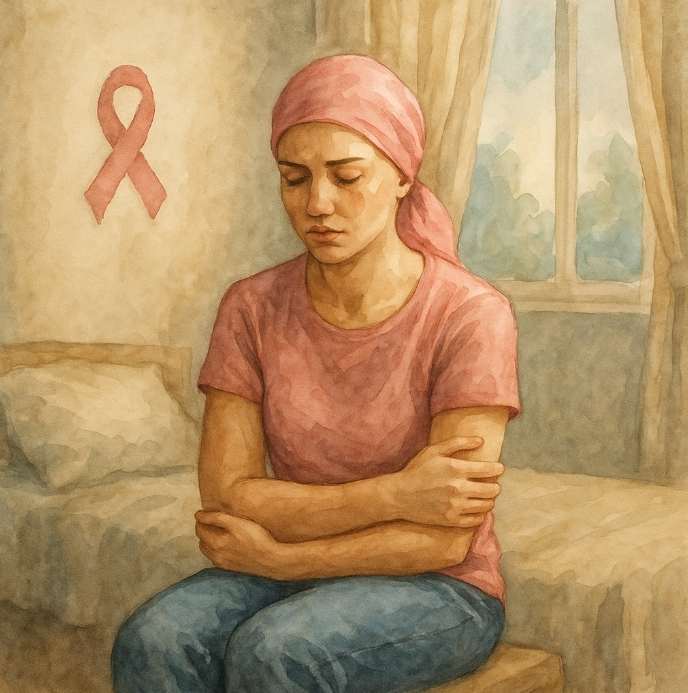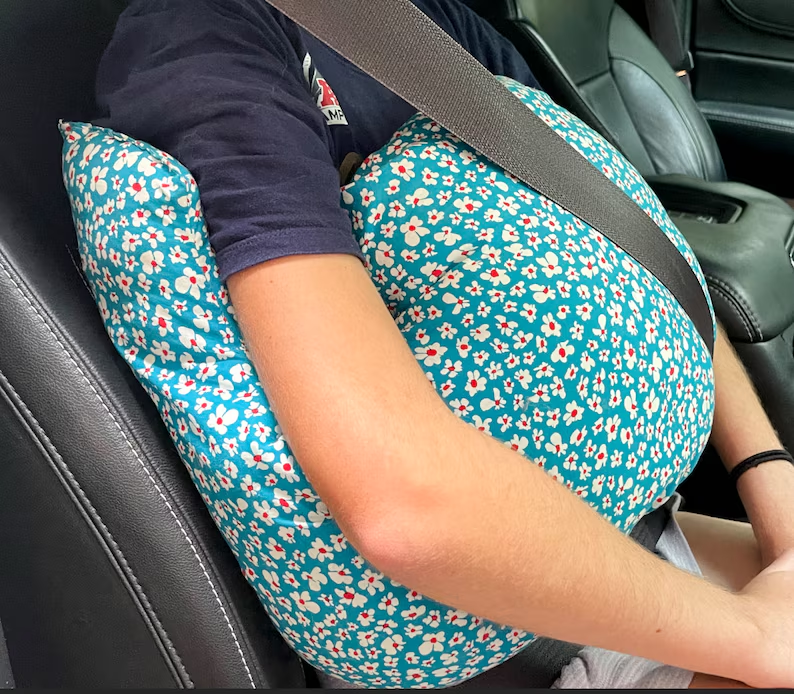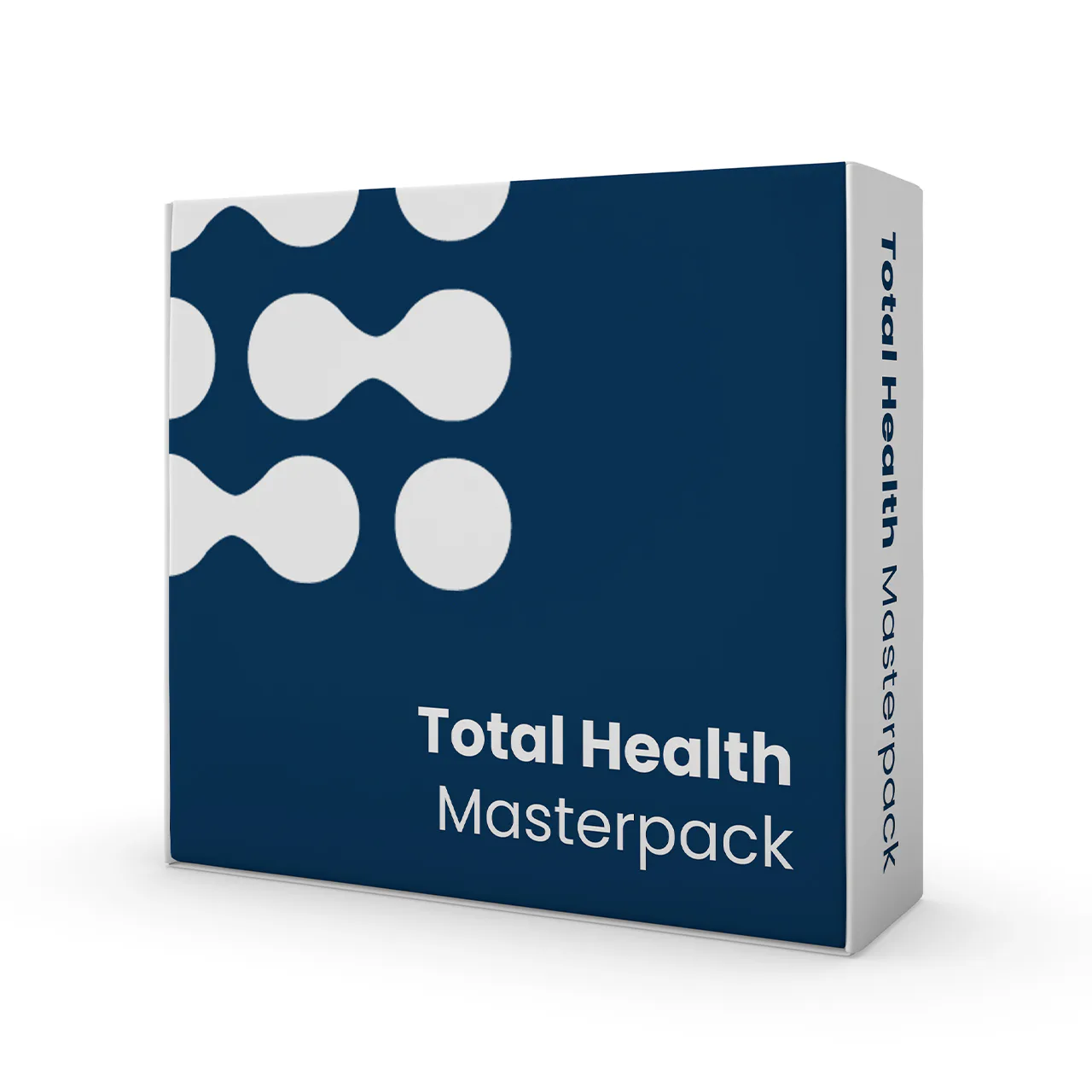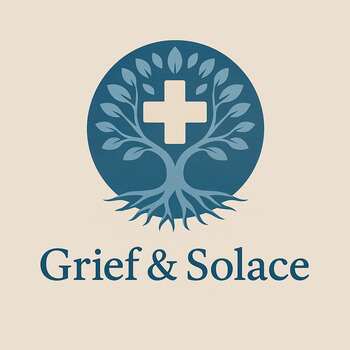Grieving Breast Cancer: When Courage Is Not Enough to Stop Goodbye
Grief in breast cancer is a quiet betrayal the body fighting, the spirit enduring, but still knowing that sometimes even bravery cannot rewrite fate.

This post blends real grief with grounded knowledge. It isn’t clinical. It isn’t distant. It’s meant to sit beside you—not above you. The story you’ll read is meant to reflect what so many feel when living through or witnessing this condition: confusion, exhaustion, and quiet forms of courage.
If what you read feels familiar, please speak with your doctor. Your pain deserves more than silence.
I Watched Her Fight with Everything She Had
I watched her fingers halt mid-lather in the shower. Just a flicker of confusion, a momentary pause, then both hands pressed down again, slower this time.
At first, she didn’t say a word. She continued dressing with a kind of stiffness, as though her body had become something foreign, something to navigate rather than to inhabit.
That night, lying in bed, she finally spoke. Quietly, she whispered, “I think I felt something.”
And with that, life splintered…
It wasn’t the diagnosis, it wasn’t the biopsy, it was simply *that sentence*… From then on, everything was cast in a new kind of shadow. Waiting rooms, Scans, The sterile smell of paper gowns and fluorescent bulbs buzzing louder than my thoughts.
🧠 Symptoms:
- New lump or thickening in the breast or underarm
- Changes in shape, size, or appearance of the breast
- Skin dimpling, puckering, or redness (may resemble an orange peel)
- Nipple changes: inversion, discharge (especially bloody), scaling, or crusting
- Persistent pain in the breast or nipple
- Swelling or warmth, even without a distinct lump
The phrase came cloaked in clinical politeness: “Invasive ductal carcinoma.” It felt like an uninvited houseguest, a threat looming over the home we had built. She nodded, as she always did as if she believed she could out-discipline the fear gripping her.
Mastectomy, Chemo, Pills with names too long to sound out, side effects far too extensive to recount. Hair falling in clumps onto the pillow, Steroid bloat rounding her cheeks, and Bandages covering her chest where softness, symmetry, and skin had once been.
Yet, it wasn’t just her body that transformed, It was her walk, Her laugh, She began to avoid mirrors…not out of vanity, but because they reflected a stranger, someone she hadn’t chosen to become.
Prevention:
- Routine screening: Mammograms, clinical exams, and breast self-awareness
- Lifestyle changes: Healthy weight, regular exercise, limited alcohol
- Preventive medications (tamoxifen, raloxifene) for high-risk individuals
- Preventive surgeries: Mastectomy or oophorectomy for BRCA carriers
Causes:
- Most breast cancers begin in:
- Milk ducts (invasive ductal carcinoma)
- Lobules (invasive lobular carcinoma)
- Caused by mutations in cell DNA, leading to uncontrolled growth
- Some inherited mutations—most notably BRCA1 and BRCA2—elevate lifetime risk
I loved her fiercely, but there were times I struggled to bear her grief. She smiled for everyone, joked through her pain, and insisted, “It’s just hair” when confronted with the clumps left in the sink. But I heard her cry at 3 a.m., believing I was asleep.
No one speaks of the quiet losses, the moment she stopped wearing perfume because it made her feel ill. How she shied away from date nights, feeling incomplete; the intimacy that became a negotiation rather than an instinctual connection.
Yet, she fought… Oh, how she fought…with spreadsheets and supplements, meditation apps, and playlists fueled by rage. She laughed, sometimes forced, sometimes genuine; She prayed, whispering words she didn’t quite believe in but uttered anyway.
I watched from the sidelines, I sat by her during chemo, I held her hand when they removed the bandages; I told her she was beautiful, even when she flinched, as if my words were a lie
She made it! She’s still here, But survival doesn’t equate to restoration; It means reconstruction of: body, spirit, and self. Some days, she gazes at the wall and asks, “Who am I now?”
And I respond in the only way I know: “You’re the woman who stayed, The woman who fought, The woman who *is.*”
She survived the cancer, but no one warned her she’d also grieve the woman she once was.”
Risk Factors:
- Biological sex: Most common in women, but men can develop it too
- Age: Risk increases significantly after age 50
- Family or personal history of breast cancer
- Inherited gene mutations (e.g., BRCA1, BRCA2)
- Early menstruation (<12) or late menopause (>55)
- Hormone replacement therapy (estrogen + progesterone)
- First child after age 30 or never being pregnant
- Alcohol use, obesity, and physical inactivity
- Radiation exposure, especially to the chest area
📘 Diagnosis & Treatment
Diagnosis:
Breast exam: Physical check for lumps or abnormalities
Mammography: Primary screening and diagnostic imaging
Ultrasound: Differentiates fluid-filled cysts from solid masses
MRI: Especially useful for dense breasts or high-risk individuals
Biopsy: Removal of tissue for lab testing, often guided by imaging
Determines cancer type, grade, hormone receptor status (ER, PR), and HER2 status
Staging (0–IV):
Based on tumor size, lymph node involvement, and metastasis
Guides treatment strategy and prognosis
Treatment Options:
Surgery:
Lumpectomy: Removal of tumor + margin of surrounding tissue
Mastectomy: Partial or full removal of breast tissue
Sentinel node biopsy: Checks first lymph nodes cancer might reach
Lymph node dissection: If cancer has spread
Reconstruction: Implants or tissue flaps, immediate or delayed
Radiation:
Often follows surgery to eliminate remaining cancer cells
Targets chest wall or lymph nodes
Side effects: fatigue, skin irritation, risk to heart/lung tissue (rare)
Chemotherapy:
Used before (neoadjuvant) or after (adjuvant) surgery
Kills fast-growing cells systemically
Side effects: nausea, hair loss, fatigue, immune suppression
More Treatment Options:
Hormone Therapy:
For ER+/PR+ tumors
Blocks body’s ability to use estrogen
Tamoxifen, Aromatase inhibitors
Ovarian suppression (meds or surgery)
Targeted Therapy:
For HER2-positive cancers
Trastuzumab (Herceptin) and others
Precision attacks on specific cellular markers
Immunotherapy:
Boosts immune system to recognize and destroy cancer
Approved for some triple-negative breast cancers
Palliative Care:
Symptom relief and emotional support
Can be integrated at any stage of treatment—not just end-of-life
I know this is heavy, and I understand that the road ahead may feel like a tangle of loss and unanswered questions. But please hear this: you are not broken because you are hurting; you are not weak because you are afraid. You are living through something real, and survival itself is a kind of grace. You are allowed to struggle, you are allowed to hope, and you are allowed to not have all the answers today. Whatever comes next, you do not face it empty-handed; you carry every moment of love that shaped you, and that will always be enough to keep going.
🎀 Gifts to help With Breast Cancer
🏥 Everyday Comforts for Everyday Battles
Managing Breast Cancer often means needing a little extra help.
Sometimes it’s about restoring dignity, ease, or simply getting through the day with less pain.
These carefully chosen tools aren’t just items; they’re small bridges back to living.
This section is about finding practical support never shame.
Post-Surgery Recovery Pillow Set – Comfort and Protection After Mastectomy
After breast surgery, even small movements hurt—sleeping, seatbelts, hugs. This pillow set is designed specifically for mastectomy and lumpectomy recovery, offering soft underarm support and chest protection where the body is most tender. It’s not just about healing, it’s about resting without fear. A small mercy after a battlefield of incisions, drains, and quiet pain.
🌿 Paths to Healing Beyond the Map
Sometimes traditional medicine isn’t enough.
If you’re exploring gentle, alternative options to help with Breast Cancer,
you might find comfort in plant-based compounds like **CBD or CBG**.
*This section is not medical advice, just a door left open.*
USA Medical Total Support Pack – Strength for the Body After Breast Cancer Treatment
After chemo, the body isn’t just tired, it’s stripped. This Total Support Pack blends broad-spectrum CBD with immune boosters, sleep aids, brain support, and stress relief to gently rebuild from the inside out. No quick fixes. Just daily, quiet reinforcement while the body learns how to be safe again. It’s made for survivors still fighting every day to feel whole.
Need a Different Path Forward?
Every journey through grief looks different. Choose the next step that speaks to where you are now:
When You're Ready to Start Healing
Healing doesn’t mean forgetting.
It means finding small ways to carry your grief with strength and grace.
These are the stories, tools, and gentle steps to begin walking forward…at your own pace.
When You're Still in the Thick of It
Sometimes healing feels like a lie.
If you’re not ready to move on…if the pain still roars louder than the world wants to hear…this is the place where you’re allowed to feel it.
No sugarcoating. No pretending. Just truth.
When You're Holding on to Who’s Still Here
Grief reminds us to love louder.
If someone you love is still with you, this is your place to celebrate them, honor them, and create new memories while there’s still time.
Joy and sorrow can live side by side.






